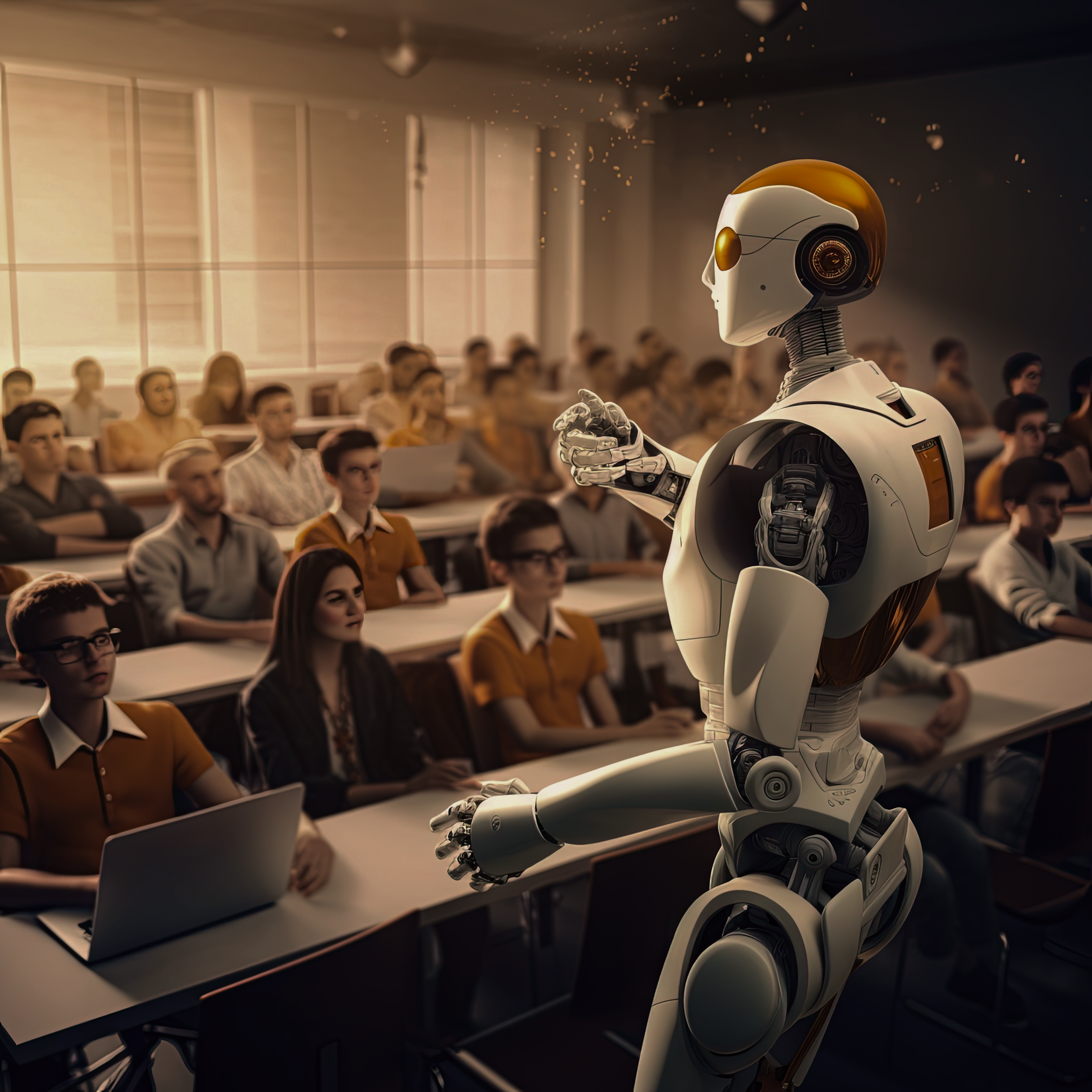In recent years, the presence of Artificial Intelligence (AI) in education has been steadily increasing, offering promising opportunities to revolutionize teaching and learning. AI, with its ability to analyze vast amounts of data and perform complex tasks, holds the potential to address long-standing challenges in education and enhance student outcomes. From personalized learning experiences to administrative efficiency, AI offers a range of benefits that have the potential to transform the educational landscape
AI has already begun to make significant strides in various areas of education, from adaptive learning platforms that tailor instruction to individual student needs to intelligent tutoring systems that provide personalized support. By harnessing the power of AI, educators can create more engaging and effective learning experiences for students, leading to improved learning outcomes and increased student engagement.
The integration of Artificial Intelligence (AI) into education is rapidly transforming the landscape of teaching and learning. With the potential to revolutionize traditional educational practices, AI offers a wide range of benefits that can enhance student learning outcomes and streamline administrative tasks. From personalized learning experiences to data-driven decision-making, AI holds immense promise for the future of education.
Additionally, AI-powered tools can streamline administrative tasks, such as grading and assessment, allowing educators to focus more on teaching and providing personalized support to their students. This shift from manual, time-consuming tasks to automated processes not only saves educators time but also enables them to allocate their resources more efficiently, ultimately benefiting both educators and students.


Overall, the growing presence of AI in education offers exciting opportunities to reimagine the teaching and learning process. By leveraging AI technology, educators can create more personalized, efficient, and effective learning experiences that meet the diverse needs of today’s learners. As AI continues to evolve, its potential to positively impact education and empower educators to better support student success is becoming increasingly evident.
Addressing Concerns:
Despite the promising potential of AI in education, there are legitimate concerns among educators regarding its impact on their roles and the quality of assessments. One common fear is that AI may replace teachers altogether, leading to a loss of human connection and personalized instruction. Additionally, educators worry that relying too heavily on AI for assessments may compromise the quality and accuracy of evaluations, potentially leading to unfair or incomplete assessments of student learning.
It’s essential to acknowledge these concerns and address them openly and transparently. While AI has the capacity to automate certain tasks traditionally performed by teachers, such as grading assessments, it is not intended to replace the critical role of educators in the classroom. Instead, AI should be viewed as a tool to support and enhance the work of educators, enabling them to focus on more meaningful interactions with students and providing personalized support.
Furthermore, concerns about the quality of assessments conducted with AI are valid and should be taken seriously. Educators rightly worry that automated grading systems may not accurately capture the complexity of student responses or provide valuable feedback that supports student learning. To address these concerns, it’s crucial to ensure that AI-powered assessment tools are rigorously tested and validated to ensure accuracy and reliability.
Despite its potential, many educators harbor concerns about the role of AI in education. There is a fear that AI may replace teachers, leading to a loss of human connection and compromising the quality of assessment. However, it’s essential to recognize that AI is not meant to replace educators but rather to augment their capabilities and support their efforts in the classroom.
Transparency is key in addressing educators’ concerns about AI in education. By providing educators with a clear understanding of how AI works, its limitations, and its potential benefits, we can foster trust and collaboration between educators and AI technology. Additionally, involving educators in the development and implementation of AI-powered tools can help ensure that these tools meet the needs of teachers and students while upholding the highest standards of assessment quality. Ultimately, by addressing educators’ concerns thoughtfully and transparently, we can harness the power of AI to support and enhance education in meaningful ways
How AI Augments Educators: DeepGrade, like other AI-powered tools in education, is designed to augment educators‘ work rather than replace it entirely. Here’s how DeepGrade works alongside teachers to enhance their effectiveness.
Automating Routine Tasks: DeepGrade automates time-consuming tasks such as grading assessments, saving educators valuable time that can be redirected towards more impactful activities, such as lesson planning, individualized instruction, and student engagement. By automating routine tasks, DeepGrade allows educators to focus on what they do best—teaching and mentoring students.
Providing Efficient Feedback: DeepGrade provides efficient and consistent feedback on student assessments, enabling educators to identify areas of strength and weakness quickly. By automating the grading process, DeepGrade ensures that students receive timely feedback, which is essential for supporting their learning and growth. Educators can then use this feedback to tailor their instruction to meet students’ individual needs effectively.
One such example of AI augmentation is DeepGrade, an innovative AI-powered grading platform. DeepGrade works alongside teachers, automating time-consuming grading tasks and providing valuable insights into student performance. By leveraging AI technology, DeepGrade enables educators to focus more on engaging with students, providing personalized feedback, and designing tailored instructional strategies.
Analyzing Data and Insights: DeepGrade analyzes assessment data to provide educators with valuable insights into student performance and learning trends. By identifying patterns and trends in student responses, DeepGrade helps educators pinpoint areas where students may be struggling or excelling. This data-driven approach empowers educators to make informed decisions about their teaching practices, curriculum design, and intervention strategies.
Personalizing Instruction: DeepGrade enables educators to personalize instruction based on individual student needs and learning styles. By providing detailed insights into student performance, DeepGrade helps educators tailor their instruction to address specific areas of weakness and provide targeted support to students who need it most. This personalized approach to instruction can lead to better learning outcomes for all students.
Overall, DeepGrade serves as a valuable tool for educators by automating routine tasks, providing efficient feedback, analyzing data and insights, and personalizing instruction. By working alongside teachers to enhance their effectiveness, DeepGrade helps educators maximize their impact in the classroom and support student learning and growth.
The Future of EdTech:
As we look ahead, the potential of AI in education is vast, promising, and continuously evolving. Here’s a brief exploration of how AI can personalize learning experiences and improve educational outcomes.
Personalized Learning: AI has the potential to revolutionize the way students learn by personalizing their educational experiences. With AI-powered adaptive learning platforms like DeepGrade, students can receive customized learning pathways tailored to their individual needs, interests, and learning styles. By analyzing student data and performance in real-time, AI can dynamically adjust instructional content, pacing, and difficulty levels to optimize learning outcomes for each student.
Looking ahead, the future of educational technology (EdTech) holds immense potential for AI to further personalize learning experiences and improve educational outcomes. With AI-driven adaptive learning platforms, educators can tailor instruction to meet the individual needs and learning styles of each student. Additionally, AI-powered analytics tools can provide real-time data insights, allowing educators to make informed instructional decisions and track student progress more effectively.
Enhanced Student Engagement: AI-driven technologies, such as intelligent tutoring systems and virtual reality simulations, can create immersive and interactive learning experiences that captivate students’ attention and foster deeper engagement. By incorporating elements of gamification, multimedia, and interactive feedback, AI-powered educational tools can make learning more enjoyable, motivating, and effective.
Data-Driven Decision Making: AI enables educators and policymakers to make data-driven decisions by analyzing vast amounts of educational data to identify trends, patterns, and insights. By harnessing the power of AI analytics, educators can gain valuable insights into student performance, learning progress, and areas of improvement. This data-driven approach empowers educators to identify effective teaching strategies, target interventions, and allocate resources more effectively to support student success.
Lifelong Learning and Skill Development: AI-powered educational platforms can support lifelong learning and skill development by providing personalized learning opportunities tailored to individuals’ evolving needs and goals. Whether it’s upskilling for career advancement, mastering a new language, or exploring a new hobby, AI-driven platforms can deliver personalized learning experiences that empower individuals to achieve their full potential and thrive in a rapidly changing world.
Overall, the future of EdTech powered by AI holds tremendous promise for personalizing learning experiences, enhancing student engagement, enabling data-driven decision-making, and supporting lifelong learning and skill development. As AI continues to advance, educators, policymakers, and EdTech developers must collaborate to harness its full potential and create a more equitable, inclusive, and effective education system for all learners.
Conclusion:
In conclusion, while there may be concerns and uncertainties surrounding the integration of AI in education, it’s essential to recognize the positive role it can play in supporting educators and creating a more effective learning environment. AI has the potential to revolutionize education by offering personalized learning experiences, enhancing student engagement, enabling data-driven decision-making, and supporting lifelong learning and skill development.
Despite fears about AI replacing teachers, the reality is that AI is designed to augment educators, not replace them. Platforms like DeepGrade work alongside teachers, automating routine tasks such as grading assessments, providing valuable insights into student performance, and freeing up time for educators to focus on what truly matters – personalized instruction, mentorship, and support for students.
In conclusion, while concerns about AI in education are understandable, it’s essential to recognize the positive role that AI can play in supporting educators and creating a more effective learning environment. By embracing AI technology like DeepGrade, educators can harness the power of AI to enhance their teaching practices, improve student outcomes, and ultimately, prepare students for success in an increasingly digital world. As AI continues to evolve, its potential to revolutionize education and empower educators remains a promising and exciting prospect.
By harnessing the power of AI, educators can unlock new opportunities to meet the diverse needs of their students, identify areas of improvement, and tailor instruction to individual learning styles and preferences. AI-driven tools can also help educators identify effective teaching strategies, track student progress in real-time, and intervene proactively to address learning gaps and challenges.
Moreover, AI has the potential to create a more inclusive and equitable learning environment by providing personalized support for students with diverse backgrounds, abilities, and learning needs. By leveraging AI-driven analytics and insights, educators can ensure that every student receives the support and resources they need to succeed.
As we look to the future of education, it’s clear that AI will continue to play a crucial role in transforming teaching and learning. By embracing AI as a valuable tool in their toolkit, educators can harness its full potential to create a more engaging, effective, and student-centered learning experience for all learners. Together, educators and AI can work hand in hand to unlock new possibilities and empower the next generation of learners to thrive in an ever-changing world.




